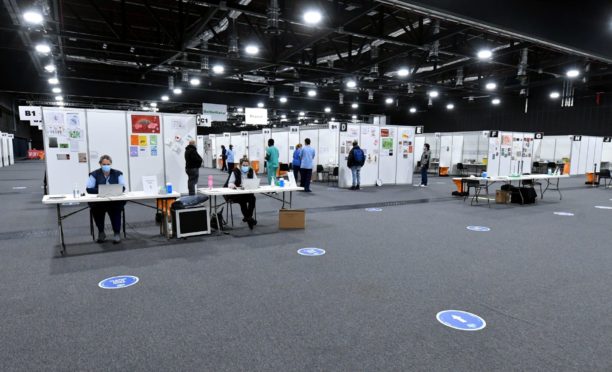Up to half of north-east residents given Covid-19 vaccine appointments are not turning up, health bosses have revealed.
The rollout, which began in December, has seen high uptake rates and the vast majority of those in priority groups have now had both doses.
However, with the second phase – delivering the jag to all adults under the age of 50 – now under way, NHS Grampian say they are seeing an increase in the number of people not turning up.
In some locations across the north-east, as many as half of all appointments are going unattended.
And although NHS Grampian has a list of health and public sector workers who can be called in for their vaccine if there is space, the health board has urged the public to get in touch if they are unable to attend.
Vaccine ‘best route out of pandemic’
A spokeswoman said: “We are currently seeing ‘did not attend’ rates running at between 20-50% of first dose appointments, across the vaccination programme in Grampian.
“With multiple locations and such a large number of people eligible for appointments, there will naturally be peaks and troughs in people attending. However, this rate is higher than that seen earlier in the programme.
“We are working to understand why this is happening and what we can do to enable as many people as possible to get vaccinated.
“We appreciate that the appointment times issued may not always be convenient or fit in with work and family commitments.
“It is vitally important that anyone who receives an appointment and cannot attend – or do not wish to attend – lets us know as soon as possible. Each letter contains contact details for rearranging appointments.
“Please use these as it enables us to offer slots to other people in a planned way. Simply not turning up means we have to arrange appointments at short notice, which results in a poorer experience for everyone coming for vaccination.
“The support the vaccination programme has had has been phenomenal and we are so grateful to the people of Grampian for this. Please keep working with us to ensure its continued success.”
Despite the increasing number of no-shows, officials believe the rollout in the north-east is progressing well.
As well as carrying out vaccinations on everyone aged 40-49, NHS Grampian is now issuing first appointment letters to those in the over-30 age group – and is placing particular focus on groups who may be less certain about getting the vaccine.
The health board is operating outreach initiatives to reassure those who may be unsure about the jag.
Katrina Morrison, clinical lead nurse for the vaccination programme, echoed the call for people to get in touch if they are unable to make it to their appointment, as the slot can then be offered to someone else.
Focus on diverse communities
She said: “We know there are people who do not traditionally take part in vaccination programmes. Different cultures, languages, and economic challenges can all be factors in this. Given the significance of this vaccination programme we have worked extra hard to ensure everyone who wishes to be vaccinated, can be vaccinated.
“To date, this has included an outreach clinic at the City of God church in Aberdeen in support of the African community, a special clinic for homeless people which also saw other agencies provide advice and support, and workplace clinics in Moray. We continue to explore other ways we can ensure fair access to vaccination for everyone living in the region.
“As a whole, the programme remains on track and I am confident that we will have offered vaccination to all those eligible in line with the national programme. However, we really need the support of the public to keep making progress.
“If you receive an appointment and cannot attend, please use the contact details in your letter to rearrange your appointment. It takes just minutes, but it ensures we can offer the slot to someone else and – crucially – means we do not waste vaccine.”
Renowned microbiologist and emeritus professor of bacteriology at Aberdeen University Professor Hugh Pennington said the situation maybe down to “hesitancy” among young people, but feels it is “poor behaviour” from those who do not go along to their appointments to be vaccinated.
He said: “It may well be hesitancy among younger age groups. For younger people there has always been scepticism about them getting the vaccine because the virus doesn’t hit them as hard.
“It is a bit of a concern if a significant number of people are not turning up for their vaccines. One or two may not turn up at their allotted time but this doesn’t sound as simple as that.
“It’s just bad if people aren’t turning up. It’s poor behaviour and goes against their own interests.”
